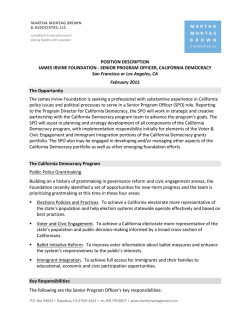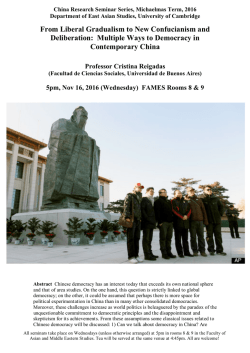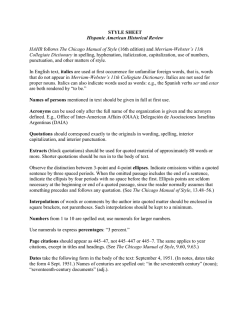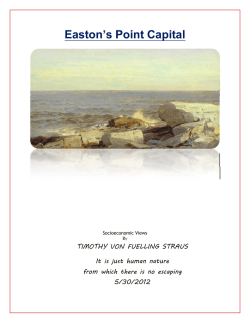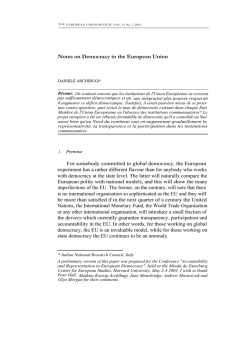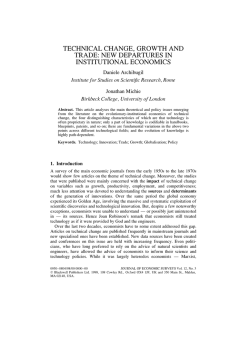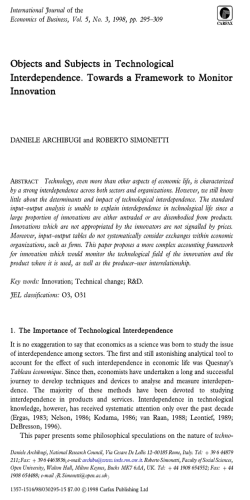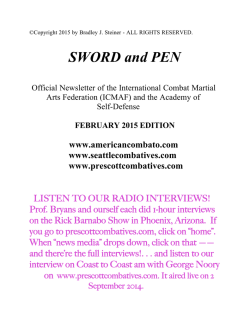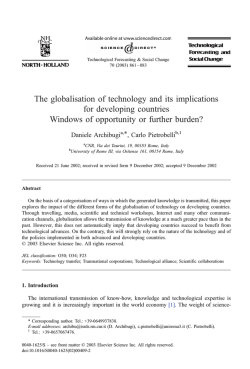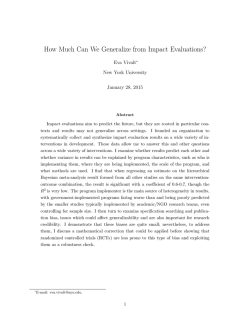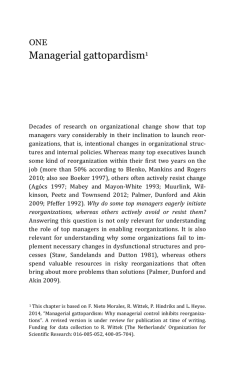
A Dialogue on international interventions: when
Ethics & Global Politics CRITICAL DEBATES A Dialogue on international interventions: when are they a right or an obligation? Daniele Archibugia* and David Chandlerb a Italian National Research Council, Rome, Italy; bCentre for The Study of Democracy, University of Westminister, London Edited by Nieves Zu´n˜iga Garcı´a-Falces1 Abstract In 15 years, the international community has been blamed for resorting too easily to the use of force on some occasions (Iraq, Afghanistan, Kosovo), and also it has been blamed for intervening too late or not at all in other crises (Rwanda, Bosnia and today Sudan and Congo). Even today, one of the most contested questions of international politics is the legitimacy for the use of force. David Chandler, Professor of International Relations at the University of Westminster (UK) and Daniele Archibugi, a research director at National Research Council (Italy) and Professor at Birkbeck College (University of London), discuss about the use of force, how the theory and practice of warfare and humanitarian intervention have evolved in the contemporary world and the international responsibility of states. In his Empire in Denial: The Politics of State-building (Pluto Press), David Chandler has forcefully argued that Western interventions are destablizing exercises of power without responsibility. Daniele Archibugi has been equally critical of these armed interventions, although in his The Global Commonwealth of Citizens. Toward Cosmopolitan Democracy (Princeton University Press), he urges for a cosmopolitan responsibility based on non-violence and inclusion.2 Nieves Zu´n˜iga: The idea that force can be used for self-defense has been traditionally accepted in international law. How has the concept been expanded over the past years? David Chandler: I think the main way that it has been expanded is that it is no longer seen as a universal right of self-defense. So for some powers, the self-selecting American-led ‘coalitions of the willing’ have argued that they have a right to selfdefense that other countries don’t necessarily have. That brings the definitions of *Correspondence to: Daniele Archibugi, Italian National Research Council, IRPPS, Via dei Taurini, 19 IT-00185 Rome, Italy. Email: [email protected] #2009 D Archibugi and D Chandler. This is an Open Access article distributed under the terms of the Creative Commons Attribution-Noncommercial 3.0 Unported License (http://creativecommons.org/licenses/by-nc/3.0/), permitting all non-commercial use, distribution, and reproduction in any medium, provided the original work is properly cited. Citation: Ethics & Global Politics. DOI: 10.3402/egp.v2i1.1974 1 (page number not for citation purpose) D. Archibugi & D. Chandler self-defense*who makes the decisions about self-defense and what it entails*into a new era. It is no longer something adjudicated by the UN, limited to an image of direct threat, but has been expanded much more broadly. Not merely in terms of the willingness to use force and the legitimacy of the objects of such force, but also in the idea that for some countries it is legitimate to use self-defense, but not for others. You’d never get people arguing that India or Pakistan have the right to self-defense or pre-emptive strikes against potential threats or should act globally in terms of preventive intervention. It’s very clear that this is a definition that stands outside any formal framework of international law. No-one is arguing for a broader extension of the right to self-defense; the debate is one of Western or ‘Great Power’ responsibilities. Daniele Archibugi: The legitimacy of self-defense is one of the problems of international life, but it is not the only one. An equally important problem is the effectiveness of self-defense. Even if the United Nations Charter and international law guarantee the right to self-defense to almost everybody, the real problem is that some powers are able to defend themselves while others are not. For example, a weak political entity such as the Palestinian people might have the legal right to selfdefense but this is not very useful since they lack the instruments to exercise this right. And therefore this should induce us to look forward. The international system should evolve from a situation in which the strong players have and can exercise their right to self-defense to a system of collective security that will make self-defense useful for all players, including the weak ones. In turn, this requires that self-defense is guaranteed by international institutions and international organizations. This is going to be in the interests of the weakest rather than of the strongest. D. Ch.: Who would give those weak states more rights? In a period where the framework of international relations is much more hierarchical than it was before, how would you possibly attempt to resurrect an order of rights and constitutionalism reminiscent of the UN Charter framework of the Cold War period? D. A.: David is touching on one of the many points on which we disagree. Shall we understand the legal framework as something which is in the interest of the stronger or something which is the interest of the weaker? Let’s assume that it was possible today to get rid of the UN and of the existing norms of international law. Would this be in the interest of the weaker or of the stronger? My opinion is that the weaker would have more to lose, because by going back to a state of nature the stronger would not have any legal constraints on their use of power. D. Ch.: That’s true, but what Daniele is talking about is pure idealism. It’s not the case that during the Cold War period and the UN Charter that it was international law that prevented countries from undertaking self-defense, or that maintained a period of so-called peace. It was much more the balance of power which meant that any interventions in countries or breaches of sovereignty risked a superpower 2 (page number not for citation purpose) A Dialogue on international interventions conflict. It was that balance of power between America and the Soviet Union that helped protect the independence and the sovereignty of smaller countries. Daniele forwards an understanding of the operation of international law independently of social relations and reality. To argue that international law on its own could solve the problems would merely result in providing a legal cover for interventionism. As we’ve seen in the discussions about changing the international laws, it’s the major powers that are calling for reform, not the small countries. So I think there’s a real danger in this idealist framework. D. A.: Sometimes it seems that once upon a time there was a golden period. This golden period was supposedly when two states had enough weapons to destroy each other and every form of life in the planet. I contest the view that during the Cold War developing countries were better off then they are now. On the contrary, they were used by the United States and the Soviet Union as weapons in a rival international strategy. There were often local wars fought with the weapons, the money and the dictatorial political leaders supported by one of the two superpowers. Local wars were more frequent then than now, and more people got killed then than now. I am not saying that the situation has improved much now. The international situation is very gloomy today as it used to be in the past. And it is quite bad because there is a hegemonic power with too much power and there are not other counter-balancing forces. But can we go back to a situation where there is a Leonid Brezhnev able to contest American hegemony? For me, this is not only undesirable, it is simply impossible. If this is the case, what we need to do is to develop some checks and balances that will be able to tame the abuses of powers, including the American power. N. Z.: Can preventive war be considered self-defense? D. A.: Of course not. Preventive wars cannot be sold as defensive wars. They are and they have always been a form of aggression which is banned by international law and by international organizations. Since today the world is dominated by democratic states, it is crucial that these states incorporate within their internal constitution the existing norms of international conduct. The most important thing today in international relations is to get a regime change in the US to get a government which repudiates entirely the legitimacy of preventive wars. D. Ch.: It seems difficult to tame American hegemony through an ideal framework of law. In the UN Charter period we had a certain clarity about what international law and wars of aggression meant. Wars of aggression were defined as wars not supported by the UN Charter chapter 7. I think that your question about whether a preventive war is a war of self-defense or a war of aggression reveals the subjective nature of our judgment, because there is no clear framework of law. The problems with the clarity of international law on this subject started in the 1990s when people argued that we needed preventive wars: wars of humanitarian intervention. Once the 3 (page number not for citation purpose) D. Archibugi & D. Chandler restrictions on preventive wars were brought into question, the floodgates were opened. The removal of a shared consensus about what the law was has created a framework where Great Power hegemony can be promoted in a more direct and hierarchical way. N. Z.: In spite of the overall architecture of the international system, there are recurrent international crises with massive human rights violations and genocides. Do the most powerful states have an obligation to intervene to prevent and stop these genocides? D. A.: Genocides have continued to occur since the end of the Second World War, and it does not seem that the end of the Cold War has generated any significant change. Whenever there has been a major humanitarian crisis, the reaction of the international community has been very weak both in terms of prevention and intervention. Certainly, people endangered, either in the former Yugoslavia or in Rwanda, have not been helped at all by the skeptical statements of those people defending the dogma of sovereignty and of non-intervention. Something more effective should be done: if there is a problem of humanitarian crises, an international society should be able to provide answers by creating appropriate accountable institutions. The alternative is to behave as the international society did in the Rwandan crisis in 1994, namely doing nothing, leading to the killing of about 800,000 people. I hope that we have learnt the lesson. D. Ch.: I think that in Rwanda, as with Bosnia, the international community was closely involved from the beginning. People were aware that there was already international reform of the governing process that created instability. There was also a war going on: an invasion from Uganda that was supported by America and Britain. One of the reasons that there was an unwillingness to intervene was that the international community was already so involved. The understanding that the genocide came out of nowhere, is as ridiculous as the idea that the genocide in Bosnia came out of nowhere without international intervention, which ignores the whole international involvement in the break up of Yugoslavia, the recognition of the separation of the republics and the undermining of the rights of the federal state to defend its borders. Unless we look at who we are asking to intervene and how the intervention is made accountable or isn’t accountable, the discussion is purely an ideal one: a fantasy world, where the good guys come in on their white horses to save people who are either too stupid or too uncivilized to resolve their own problems. My point is that posing the discussion in these terms isn’t really related to the real issues of international relations. It is no coincidence that in a world where there’s a breakdown of traditional frameworks of international relations and an undermining of the rights of smaller states, everyone should be going around discovering the savagery or the lack of political legitimacy of smaller countries in other parts of the world, rather than looking at the problems in our own countries. Why is it that Western States, Western 4 (page number not for citation purpose) A Dialogue on international interventions politicians, and critical liberal theorists need to find a sense of political purpose by criticizing governments in other parts of the world? D. A.: Of course, any historical circumstance is preceded by a long chain of events. In this long series of events it is very likely that players have been driven by their interests, and certainly the Western world has a long past of brutalities. But it seems equally a caricature to present world history as idyllic, with peoples loving each other until the ‘stupid white man’ has started to be involved. Of course the white man is often as stupid as men of any other color. Part of this stupidity is the periodic outbreaks of mass murders. When these occur, a humanitarian intervention should be performed by proper institutions. Surprisingly enough, Western democracies have a very bad record in carrying out humanitarian interventions so far. In his comprehensive review of the historical cases, Nicholas Wheeler indicates three successful cases of humanitarian intervention: India in East Pakistan in 1971, Tanzania in Uganda in 1979, and Vietnam in Cambodia in 1979. None of them was carried out by a Western democracy. This suggests that we can do better by creating multi-lateral institutions with the participation of Western democracies, but not dominated by them. D. Ch.: I think you’ll find that those three cases may have had positive outcomes from a humanitarian point of view, and could retrospectively be understood as humanitarian interventions, but they were also driven by a conception of the national self-interest of the neighboring states intervening. This is an important point. The idea that we should formalize an idea of a right or an obligation to intervene where there are no national interests and just assume that because states have the power to intervene, they have a right or duty to intervene in the affairs of other countries, when they don’t have an interest in the outcome of stability or concern for that region’s future, leaves the whole project a hostage to fortune. Governments may appeal to popular opinion and say that they are doing something to save the poor uncivilized Rwandans or Bosnians or people in Darfur but we know that those policies are purely led by the image of themselves rather than any clear strategic interest. And I think there’s a problem in giving additional rights to power. With these ‘rights’ there is no accountability and no relationship of equality. This so-called right or obligation of intervention is a responsibility that major powers take on that is very dangerous, because it’s a narcissistic responsibility that cares nothing for the outcome. We can see the same thing when you look at all sorts of policies in relationship to Africa and to non-Western states where there is a discourse of poverty reduction and ethical policies but it’s actually about creating the self-image of the generous West with a policy of values and forming a self-identity with a sense of purpose for the EU and the UN. Also, I think that the disassociation between the power of the policy maker and the people whose lives are affected on the ground is inevitably going to result in problems. The notion that only outsiders who intervene can solve the problems is crazy. When it comes to our domestic politics noone says if only the government would intervene, it would solve the problems of child 5 (page number not for citation purpose) D. Archibugi & D. Chandler abuse, drugs, prostitution, violence on the streets, and so on. It’s only in the international sphere that you can have this fantasy of an external source of power magically resolving all the problems. If we were to think of it in a more political sense, we would realize that one of the reasons why these governments are so keen to talk about problems elsewhere is that they lack a clear political vision in relation to their own societies. That might make us think twice before we give them new rights and mandates to intervene in other places around the world. N. Z.: In that case, what is the role of development aid from developed states? D. A.: From what David just said the straightforward policy conclusion is that the development aid should be canceled. There’s no reason why Western states should give money to developing countries: it’s narcissistic. The danger of this approach is that it looks mainly at the motivations rather than impact. Any action due to selfinterest or image is fine. I do not expect humans to be entirely altruistic agents. Even if they are not, the outcome might sometimes be positive, so development aid should not be cut, but increased. The bulk of the budget spent by any government is for domestic purposes. A minority of the money, 0.1% in the US and 0.3% in the EU, goes to development aid. It’s clear that the rich part of the world doesn’t do much. It’s wrong to say that they are particularly concerned with what’s happening abroad, they are mainly concerned about what they should do at home. Should the tiny responsibility of the global sphere be improved or abandoned? We shouldn’t forget that in the 20th century, 75% of the people that died as a result of political violence, died because of internal political violence and 25% died because of international political conflicts. So I would say there’s still a problem with ways in which we can control the power of governments to defend their own subjects. This applies not only to the developing world but everywhere, for example to Nazi Germany and the Soviet Union which were not under-developed countries when massive genocides took place. D. Ch.: There’s an idea that there’s a perfect solution and all we have to do is get rid of politics and then external experts can make governments practice ‘good governance’ and do all the right things and solve all the problems because we know all the answers. The only problem is that the ‘expertise’ concerned doesn’t really exist. And there are no external technical solutions to political problems, even in terms of even making our own governments accountable, let alone making international institutions accountable for what they do within the international sphere or other states. One problem is that Daniele is confusing narcissism and selfinterest. International intervention today is very different from in the Cold War: rather than some imperialist carve-up for resources or invading Kosovo because of oil pipelines or wanting more regulation and intervention in Africa to exploit raw materials, I think there’s very little of that old-fashioned, coherent planning and desire to regulate and control and so what we are talking about is not really a matter 6 (page number not for citation purpose) A Dialogue on international interventions of self-interest. If there was, there might be some semi-rational outcomes to it. These policies towards Africa and other international issues, like saving the environment, are much more narcissistic. They’re governments trying to evade the problems of the domestic sphere by arguing that the real problems lie elsewhere or are out of their control. With regard to governments focusing on the domestic sphere, if you look at the press coverage, you’ll see it’s the opposite, that the international sphere*whether you look at America, Europe or anywhere else*has dominated the press over the last decade or so. Even in Britain it’s clear that the only issue where Tony Blair and Gordon Brown have any credibility is over Africa. Tony Blair’s leading the Commission for Africa; Gordon Brown hasn’t got much of a reputation for the British economy, but he’s over there lecturing the African governments about corruption. That doesn’t mean that a lot of money is spent in the international sphere and that’s what I mean about narcissism. It’s about rhetoric; it’s about counterposing us as a ‘good government’ to other countries, whether it’s Eastern Europe, Asia or Africa, who have ‘bad governments’. There’s a constant rhetorical sphere of declarations condemning other countries and quite often an unwillingness to undertake to do anything because you can always blame America, or someone else*the gap between high blown policy rhetoric and limited practice is quite astounding. Aid isn’t really concerned with the economic problems of African states and the development of their economies and their industries. There’s simply no way that development aid could be a solution to these broader socio-economic problems. D. A.: Are you suggesting cutting development aid? D. Ch.: What I’m saying is that development aid hasn’t been shown to be effective. Many analysts correctly point out that aid doesn’t often lead to sustainable, coherent frameworks of development, and that serious economic policy making, if there was a real concern about African development would take an entirely different approach. Expecting international governments to rationally assist other countries is as ridiculous as to expect them to rationally develop their domestic policies. It’s very difficult for governments to structure a clear political strategy because there’s a crisis of political meaning and purpose within the West. That’s why governments want to transfer their focus abroad. If you look at the new relations between Western institutions and, particularly, African states, you find that the problem with aid and debt reduction is that it comes with strings attached about policy frameworks, heavily restricting African sovereignty and state’s independence. And the debt reduction is specifically managed through new frameworks of internationalizing the institutions of African states, where Western institutions tell African governments how to allocate their money and how to manage their policies. The problem isn’t giving money to African states at all: it’s the political conditionality that comes with it. The main impact hasn’t been poverty reduction and the development of Africa and greater African independence. The impact has been a loss of Africa’s political autonomy. So despite the rhetoric of 7 (page number not for citation purpose) D. Archibugi & D. Chandler empowerment and capacity building etc., I would argue that the new mechanisms of regulation should be opposed. And that’s not a critique of giving aid in itself, it’s a critique of the new elitist, patronizing climate where the aid donors think that they can manage African economies and societies better than African people themselves. N. Z.: It is clear that the international system is based on some relations of dependency unfair for several states. How could a fair international system be possible? D.A.: The problem is that we are still in the infancy of an international society. So far, there are a few powers which have too much power, mostly in the West, and we must try to find some way to tame it. The good news is that part of the West has some form of accountable democratic government and the bad news is that the accountable and democratic government sometimes applies internally but does not apply at an international level. That is why if we want to have a fairer international society, we need to expand the checks and balances that have been successfully created in some countries at an international level. Sometimes this can work, for example, when America’s Supreme Court decided that the Guantanamo Prison is illegal. And this is the way that international society can be constructed. If we would have used the arguments of David one or two centuries ago, the conclusion would have been that democracy was impossible, narcissistic and a fantasy to divert attention away from other things. But even if theatrical and narcissistic, democracy has managed to tame power much more than other regimes. Now the same thing should be done at an international level. D. Ch.: The point about world democracy and taming the US is that this is a highly elitist view of the management of international affairs. Even though, like Western governments and international institutions, Daniele talks about democracy and its importance, you can see that underneath the excellent scheme that he outlines, the one thing that’s missing is the people. In effect, he’s arguing that European states should play a greater role in international society as a counterweight to America, as if the Europeans could be good imperialists and good interveners and spread democracy or spread nicer market relations than America. This is his view of taming America, of the European elite playing a much more forceful and interventionist and counterbalancing role. N. Z.: What role should Europe play in this scenario? D. Ch.: I think that this idea of the good Europeans versus the bad Americans is a particular European conceit. If we look at the policies that the EU pursues, for instance in the enlargements in Eastern Europe, you can see that the internationalization of those state structures, the imposition of 80,000 pages of European acquis in effect undermines those countries’ sovereignty. The EU doesn’t promote democracy any more than America does. And I think that the argument that the 8 (page number not for citation purpose) A Dialogue on international interventions EU is somehow preferring a nicer capitalism or is somehow more ethical and more moral, is believing the EU’s Public Relations (PR) machine and taking press releases at face value. While it’s true that the EU comprises of more than one state, it doesn’t mean that it’s a new post-national constellation as Habermas would argue or a postmodern actor that is no longer pursuing any form of interests or power in the world, as Robert Cooper would argue. It is very dangerous to talk about taming American power in this way because rather than looking at political problems and the American people’s capacity to tame American power, to challenge the policies of the government, the policies are immediately given over to other elites. In fact the more you look at so-called cosmopolitan democracy advocates, the less substantial democracy you see. D. A.: A democratic society should be based on checks and balances and the more checks and balances the better they are. Sometimes checks and balances are from non-elected judges, sometimes from the people and of course the American people should do much more than what they have done so far in order to tame this power. I hope that Barack Obama will represent a change compared to the previous administration. David is wrong on the EU: the EU has done much better than the US at democratizing other countries. Let’s take the example of other Eastern European countries. What I like about the EU is that as soon as they accept a new member country: the Czech Republic, Poland, the Baltic Republics and so on, they immediately provide to this country’s equal rights in the European condominium. Soon these countries will be the president of the EU for six months, for example. They will have proportional representation in the European Parliament and in many other institutions. The US have never done anything like that. If we expand the argument, we should argue that after they have been invaded by the Americans (and many European countries) Iraq and Afghanistan should become the 51st and 52nd members of the US. And of course that isn’t going to happen. So I see a basic difference in the way which Americans patronize other countries, even today pushing them to be democratic, and the way the EU does it. In other words, the Americans use a power that is much more direct, while the EU, precisely because it is a union of states, has the inclination to use sub-powers. Maybe it’s also associated to the fact that it has less military capability and is an organization with power divided among different national governments. In any international situation, the more important players you get, the better it is. And if the EU could manage to be a powerful organization to counter-balance the US, that would be very helpful and ultimately also in the interest of the American people. Take the case of Iraq. The Bush administration has managed to divide Europe. Half the European countries decided to join the ‘coalition of the willing’ and the other half decided not to. It’s good enough that in at least two countries, Spain and Italy, the national governments that decided to join the coalition of the willing, were overthrown by the voters at the next elections (even if in Italy not for very long). I would like to see a powerful, regional organization in Latin America and in the African union. And the basic idea of cosmopolitan democracy is that we are not advocating a structural 9 (page number not for citation purpose) D. Archibugi & D. Chandler power on other people, but we are advocating structural power with other people. In any proposal carried out by the cosmopolitan democracy approach we always assume that the new institutions should be made by different people working together. These institutions would reflect developing countries more than Western countries, for the simple reason that developing countries have more people. D. Ch.: I don’t think it’s true that American power is always exercised more directly than Europe’s. It’s true that America is a major military power but it hasn’t really used that military force that often. The invasion of Kosovo was supported by practically all European states, and the war in Iraq was supported by some of them. Britain is just as happy to use military power as America is. Britain has gone to war at least as many times as America. Look at the French interventions and the role of Italy in the Balkans and Eastern Europe. The argument that the EU is promoting democracy in the EU and is giving Eastern European accession states a set of choices isn’t borne out by any empirical evidence. If you look at the agreements for joining the EU, you find that the Eastern European states may have a vote when they get into it but they can’t opt out of any of the clauses from the extended European acquis, so the entire negotiation process is already loaded against Eastern Europe. If you look at the Balkans, you’ll find that the EU special representative has the job of being the high representative*an administrator with both executive and legislative powers*over Bosnia. And the EU has been more than happy to allow the continuation of these dictatorial powers of the EU representative, including to sack elected politicians and to impose laws by edict. In fact this makes the American occupation of Iraq look weak and less ‘direct’. The idea that America can be blamed for dividing the European countries and creating uncertainty about foreign policy ignores the problems of the credibility of European governments and the way that they will try to use the pro-war or the antiwar card as a way of claiming moral credibility. The process of being for or against the war was a fairly arbitrary one and you can’t just blame America for it. D. A.: There are clear differences between the US and Europe. Of course the UK and France have been to war many times but the EU as such hasn’t waged any war because it doesn’t have the institutions to do that. The only occasion on which the EU gave authorization for the use of force in the Kosovo war was through NATO. The fact that there is no EU army means that the EU can use certain instruments, but not others. D. Ch.: So should there be an EU army? D. A.: No. D. Ch.: Should there be a UN army? D. A.: Yes, possibly. 10 (page number not for citation purpose) A Dialogue on international interventions D. Ch.: So why not an EU army? D. A.: Because it’s not needed. The EU should use its soft power: soft power is much more effective than hard power. D. Ch.: So why does the UN need an army? D. A.: Because in some cases of humanitarian emergencies, you need to intervene with some forces. This army should be different from other ones: a police force rather than an army. N. Z.: One of the main political consequences of the invasion of Iraq was to lower the political credibility of the UN. American neocons argue that the UN is dead because it failed to provide its support to the world hegemonic power. Now global activists argue that the UN is equally dead because it has not managed to stop the Iraqi invasion. Is there still a function for the UN in this century? D. A.: The UN is in very bad shape because it has not yet managed to enforce its Charter. The Security Council did not approve the Iraq War, nor did it make an attempt to condemn it. This is for the simple reason that the US and UK are permanent members. So the situation is gloomy, and for precisely this reason the UN still has a vital role to play. This vital role will increase provided that more forces start actively working within the UN, that some countries bring the public into the UN in a more direct way, and that it becomes more closely linked to the many global movements that have been active on global issues recently. All these actions are, of course, to counter-balance the attempts of the major powers to use the UN as an instrument of their foreign policy. Developing countries have so far been quite divided and they haven’t managed to stop as much as they should have. The European countries are also divided and some of them find an interest in using the UN in this form. Thus the status quo remains. But in spite of all this, I don’t think the world be a better place without the UN. The UN is still a forum where everything can be discussed transparently. And the fact that Colin Powell had to go before the Security Council to present evidence for the alleged Weapons of Mass Destruction (WMDs) was a triumph for the UN. Once upon a time in international politics, Kruschev and Kennedy or Nixon and Brezhnev decided everything. And after a few months one country would go on the Western side; another country would go on the Soviet side. There were a lot of wars and people killed and there was no transparency or accountability. The people in the US and Europe didn’t know what to do and couldn’t even oppose what the governments were deciding because everything was secret. Now, at least, there is a bit more transparency. The more we manage to use and improve the UN machinery for international politics, the better things will be. 11 (page number not for citation purpose) D. Archibugi & D. Chandler D. Ch.: In the past the UN was a political organization. It was concerned with political consensus. It didn’t really do anything unless it had the wherewithal to act on it, which is why all the exciting stuff happened in the smoke-filled rooms where the diplomats got together and did their deals, and on the UN conference floor we had fairly bland agreements. Today we seem to have the opposite situation: everything happens out on the conference floor. It is very peculiar for a political organization that is meant to be engaged in having a genuine framework of consensus-building. That seems to have disappeared from the UN. If anything, the UN acts like an NGO, making great moral statements*or as a platform for other people to make moral declarations about poverty, AIDS, women’s rights and the environment*declarations that have got very little to do with reality or actually putting the resources or political will behind them. The UN plays a vital role as a whipping boy who can be blamed when these grand declarations eventually come to nothing. The fac¸ ade of the UN that gives some political legitimacy to a process that no longer involves any genuine framework of negotiation, that no longer involves policy-making that is at all accountable, is a very dangerous one. The UN’s role in legitimizing this pseudo-politics, where you can just make declarations and everyone thinks it is fine, and maybe in ten years’ time we look at whether anything actually happened and who’s to blame, is problematic because now, if ever, we need to have some framework of political accountability. At least in the past there was a political process, and the UN was a political and legal framework where sovereign states took responsibility for their actions. Today there’s a real danger of rhetoric being distanced from the real world. N. Z.: What actions can be taken in order to increase the powers and functions of the UN? D. Ch.: The UN does not have power as an independent organization: it is an association of states. It is a bit like increasing the power of the EU. If the EU member states do not have a consensus of agreement on policies, the EU won’t have a lot of power in that particular area. Maybe what we’re asking is: ‘How can we have a clear and stable international order?’ I think the problem in attaining one is that international politics is increasingly about rhetorical statements. Governments and international institutions are not being sufficiently held to account. So the only way we can begin to rein in the fantasy realm of the international is by holding domestic governments to account and unfortunately there are no easy solutions to reviving the process of getting people re-involved in politics. There are no easy shortcuts. D. A.: I have got very clear views on what can be done to make the UN stronger. Firstly, we can get at least one UN ambassador to be directly elected by the people of each country. A UN ambassador will not just be an ambassador, but accountable to some people. Also, the people will know what the UN is doing because advertising campaigns will present evidence on UN actions and that will possibly make them want to interact more with what is going on in New York. Secondly, many people, 12 (page number not for citation purpose) A Dialogue on international interventions including myself, suggest creating a UN people’s assembly and the peace movement in Italy has already done some general tests. On several occasions, the Perugia Assembly of the Peoples of the United Nations invited representatives of citizens that are not necessarily associated to their governments. This gives an idea of what a World Parliament could look like: it could be made by a few hundred representatives, with a majority of the deputies from developing countries. Even if such a new Parliament would not have many powers, it will indicate that democracy is not a Western monopoly. One of the problems of the Reagan and Bush Jr. administrations is that they assumed that since they were elected, any foreign policy decision they took was legitimate. I think that increasing democracy in international organizations would be a very good way in which you could destroy the rhetorical tool so often used by American and European politicians. A global parliament will show that there is another and wider democratic consensus. D. Ch.: I am surprised that an advocate of democracy should understand democracy in such empty and formal terms. The problems of democracy, accountability, and the international arena are not going to be resolved by holding more and different elections. What we need are political ideas and political alternatives. Just trying to rearrange the game differently and have the UN ambassador come to schools or getting people to vote in an election can not change the balance of power or the balance of social relations in the world or even people’s views about what is possible and what the sensible alternatives are. I think it is a very peculiar and dangerous idea because you would only end up giving more legitimacy to an institution in which some external view of independent legitimacy makes little sense because it only works as an institution if it is dependent on political consensus between its member states. And even worse, since an independently elected representative to the UN may not even be a member of the same political party as the government, this would just lead to the UN being even more of a rhetorical, non-policy-making forum. The idea that we can only solve the problems of politics by adding different elections is a purely technocratic and bureaucratic response, which ignores political and social relations at the international level. D. A.: All the arguments that David has provided against a UN people’s assembly of elected ambassadors to the UN, can be applied in any country. And in the same argument you should probably say that the Prime Minister in Britain should not be elected and that the parliament in this country is useless. The arguments are precisely the same. A clear causal relationship between formal institution and substantial institution doesn’t exist: the two things progress hand in hand. They did, in an imperfect way, within countries because we managed to get elected governments and parliaments. If you read the old realist arguments against democratic governments and parliaments, you see that are the same of those used today by David. In spite of these sceptics, democracy managed to progress in some countries. By pushing 13 (page number not for citation purpose) D. Archibugi & D. Chandler forward with incremental innovations at a world level, we would plant some seeds that, in time, may bring us closer to global democracy. D. Ch.: How would you possibly get closer to global democracy? If you took your scheme seriously, you would be saying that state sovereignty would not be relevant, and that would be creating a superpower that could override the rights of states. This can only give more rights to power: it can only reinforce the status quo. The international system is composed of states. Because we don’t live in a fantasy world where we all share the same interests, where politics doesn’t exist, those ideas are very dangerous. D. A.: Structures of power do not destroy each other. In Italy, we managed to have city governments in medieval times. As Robert Putnam showed, the local government is effective when there were city governments already five or six centuries ago. National government seems to be less a decisive factor in shaping the effectiveness of local government than a long-term tradition. The national government has not managed to destroy the good governments of cities like Siena, Florence, and Bologna. Likewise, adding another form of government at the international level doesn’t in any way imply that you reduce the existing forms of government. On the contrary, you make them stronger because you provide a way in which issues which are beyond their competences can be addressed. N. Z.: Before finishing, I would like to ask you something related to the new US President. The George W. Bush administration has violated international law and it has paid a very small price. Do you think that the new President Barack Obama will make a difference? D. A.: A substantial part of the American public opinion was strongly dissatisfied with the foreign polity of the Bush administration and, in fact, both John McCain and Barack Obama promised a substantial turn in foreign policy. I am optimistic about the Obama Presidency, but the world should not and cannot rely on the goodwillingness of the tenant of the White House only. Something more is needed, namely to develop global institutions that will constrain the national executive powers, including the American one. I will urge the Obama administration to fully participate to the international judicial institutions and, in particular, to adhere to the International Criminal Court and to accept the compulsory jurisdiction of the International Court of Justice. This will be an incentive, perhaps small in terms of power but large in terms of legitimacy, to respect the rule of law in foreign policy. This will provide additional international ‘checks and balances’. If introduced, democratic governments will have an increasing difficulty to explain to their electorates why they have violated international laws while they require their own citizens to respect the internal laws. 14 (page number not for citation purpose) A Dialogue on international interventions D. Ch.: I think Daniele’s conflation of democracy with international law is a dangerous one. In effect, he is arguing that unaccountable institutions should be able to restrain, or could ‘make accountable’ national governments. International law is not subject to popular accountability in the same way as domestic law and therefore is much more likely to enforce rather than to challenge unequal power relations. In arguing for international law, Daniele is, in effect, suggesting that bureaucrats should be trusted more than elected representatives. This makes little sense. It would be illusory to understand international law as somehow constraining US or European power or to view International Criminal Court (ICC) intervention as playing a positive role in conflict resolution in Africa or the Balkans. Law and power politics are separate spheres, one is based on reciprocity and formal equality the other is based on power relations. Attempting to force them together results in the manipulation and politicization or law. I hope that Obama does not make the therapeutic or token gesture of committing the US to international law, this would merely weaken the legitimacy of international law further. At least Bush’s ‘US exceptionalism’ expressed a certain honesty regarding the inequality of the international sphere and the fact that, when it matters, international law is either subservient to the needs of power or is empty rhetoric. NOTES 1. 2. This dialogue is an updated version of the one started for the journal Papeles de Relaciones Ecosociales y Cambio Global (no. 96, winter 2006/2007, www.revistapapeles.fuhem.es). Nieves Zu´ n˜ iga Garcı´a-Falces is member of the editorial board of Papeles de Relaciones Ecosociales y Cambio Global and Research Student at the Government Department at the University of Essex (UK). 15 (page number not for citation purpose)
© Copyright 2026
